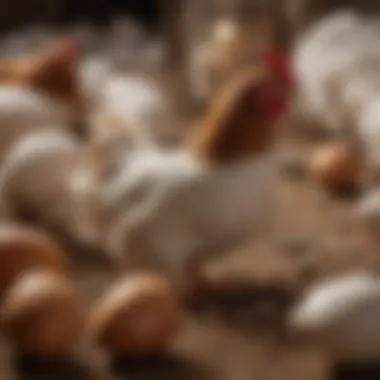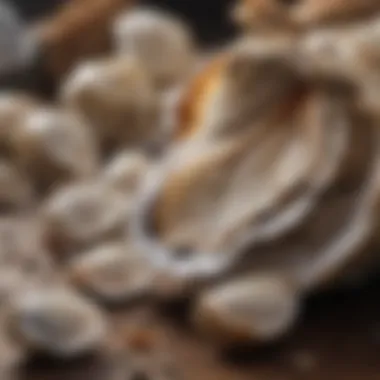The Importance of Oyster Shell Supplements for Chickens


Intro
Oyster shell supplements have become a prominent topic among chicken enthusiasts and poultry experts alike. Their primary value lies in providing an essential source of calcium, crucial for the health and productivity of laying hens. As chickens age or when they enter the laying phase, their calcium needs increase significantly. This article will explore the nutritional benefits of oyster shell supplements, focusing on how they affect eggshell strength, overall hen health, and the optimal strategies for incorporating them into a chicken’s diet.
Understanding the importance of calcium in a hen’s diet is foundational for poultry owners looking to improve egg production and quality. It is clear that adequate calcium intake plays a major role. However, there are other factors to consider as well.
Nutritional Value of Oyster Shells
Oyster shells are rich in calcium carbonate, containing about 38% to 40% calcium. This specialized supplement works effectively in replenishing calcium levels, directly impacting the strength and thickness of eggshells. Hens that receive insufficient calcium often produce eggs with thin, fragile shells or may even stop laying altogether. This can have significant economic implications for small farms or backyard chicken keepers.
Another advantage of oyster shells is their slow dissolution rate. When fed, they break down gradually within the hen's gizzard, slowly releasing calcium throughout the day. This slow release helps maintain steady calcium levels, which is important for continuous egg production.
Incorporating Oyster Shells into the Diet
Incorporating oyster shell supplements should not be done haphazardly. Chicken owners should aim for a balanced diet. This means ensuring that oyster shells are offered as a free-choice supplement rather than mixing them directly into the feed. Hens will consume oyster shells as needed, allowing for self-regulation of their nutrient intake.
A practical recommendation is to provide oyster shells in a separate feeder. This not only facilitates easier access but also encourages hens to supplement their diet without disrupting the balance of other nutrients.
Common Misconceptions
Despite their benefits, misconceptions surrounding oyster shells persist. Some poultry keepers may assume that feeding solely oyster shells will remedy all calcium deficiencies. While these supplements are crucial, they are not complete feeds and lack other essential nutrients. It is vital to feed a well-rounded diet that includes vitamins and minerals necessary for overall health.
Moreover, there are concerns regarding sourcing and quality. Not all oyster shells are created equal, and it is essential to choose high-quality products that are free from contaminants. Prioritizing reputable suppliers can ensure the health of your flock.
The efficacy of oyster shell supplement is strongly supported by scientific research, validating their vital role in supporting laying hens' diet and health.
Culmination
Preface to Oyster Shell Supplements
The use of oyster shell supplements in poultry nutrition has gained significant attention among chicken owners and farmers. Proper nutrient intake is critical for optimal chicken health and productivity, especially for laying hens. Among the variety of supplements available, oyster shells stand out due to their calcium content, which is vital in egg production and overall animal health.
Oyster shells provide an easily digestible source of calcium. The significance of this nutrient cannot be overstated. Calcium plays a key role in the formation and strength of eggshells. A strong eggshell not only protects the developing chick but also reduces the risk of breakage during handling and transport.
Additionally, oyster shells have other benefits. They can aid in maintaining bone density and support metabolic functions in chickens. The supplementation of oyster shell enhances the nutrition of hens, contributing to a productive laying cycle and healthier flock overall.
When considering the use of oyster shell supplements, it's essential to reflect on dosage and incorporation into feed. Educating themselves on these aspects allows chicken owners to optimize the benefits and assure their hens are receiving adequate nutrients. This introduction serves as a foundation for understanding the depth of oyster shell supplementation in poultry nutrition.
Understanding Oyster Shells
Oyster shells are the hardened outer layers of oysters, often collected from marine environments. They consist primarily of calcium carbonate, making up about 95% of their composition. This high concentration of calcium makes them an excellent dietary supplement for chickens.
In addition to calcium, oyster shells contain small amounts of other minerals such as magnesium, phosphorus, and trace elements. These additional nutrients play supportive roles in poultry health, although calcium remains the main focus for laying hens.
The shells are ground into a fine powder or larger granules before being added to chicken feed. This process ensures that chickens can consume the shells without difficulty, allowing for efficient calcium absorption.
Overall, the simplicity of oyster shells belies their nutritional punch. They represent a natural and effective way to meet the calcium needs of poultry, crucial for maintaining productivity and health.
History of Use in Poultry
The practice of using oyster shells in poultry diets is not new. Historically, farmers have turned to natural sources to meet the nutritional requirements of their flock. Evidence of this practice dates back centuries. Traditional poultry keepers recognized the value of oyster shells long before modern nutritional science could quantify their benefits.
In various cultures, including European and Asian societies, oyster shells were collected and used as a calcium source for poultry, particularly during laying seasons. This historical context shows the enduring practicality of oyster shells in agriculture.


In recent years, as poultry farming has evolved, there has been a resurgence of interest in natural supplements like oyster shells. Modern poultry research supports traditional practices, confirming the value of oyster shells for enhancing poultry health and productivity. This history of use underscores the relationship between natural resources and animal husbandry, with oyster shells continuing to play an important role in contemporary poultry nutrition.
Nutritional Composition of Oyster Shells
Oyster shell supplements are often considered a valuable addition to the diet of chickens, particularly laying hens. Understanding the nutritional composition of these supplements is essential for poultry owners who seek to optimize their flock's health and performance. This section focuses on the specific nutrients found in oyster shells and their significance for chickens.
Calcium Content
Oyster shells are primarily known for their high calcium content, which is crucial for chickens, especially in egg production. Calcium plays a vital role in forming strong eggshells. A deficiency in calcium can lead to thin or weak shells, increasing the risk of breakage and negatively impacting the overall productivity of hens.
Research shows that oyster shells can contain up to 95% calcium carbonate. This high concentration makes it an effective source of calcium for poultry. When hens receive adequate calcium, they have more energy and nutrients available for producing eggs. Additionally, this mineral supports bone strength and overall wellness, reducing the likelihood of health issues related to calcium deficiency.
Regular supplementation of oyster shells can help in maintaining optimal calcium levels, leading to healthier and more productive flocks.
Other Nutrients Present
In addition to calcium, oyster shells also contain other essential nutrients that can contribute to poultry health, although in smaller amounts. Some of these include:
- Magnesium: Important for various bodily functions and supports calcium absorption.
- Phosphorus: Works together with calcium to build and maintain healthy bones.
- Trace minerals: These may include copper, zinc, and manganese, which support metabolic functions.
Each of these nutrients can play a supportive role in ensuring that the chickens maintain a balanced diet. However, it is important for poultry owners to understand that while oyster shells provide significant calcium, they should not be the only source of these nutrients. A well-rounded diet will include a variety of feed sources and supplements.
In summary, the nutritional composition of oyster shells provides significant benefits, particularly in terms of calcium content. Ensuring chickens receive these nutrients can enhance their overall health and productivity.
Benefits of Oyster Shell Supplementation
The supplementation of oyster shells in the diet of chickens presents several noteworthy advantages. Understanding these benefits is crucial for poultry owners who seek to optimize both the health and productivity of their flocks. Among these advantages, enhancing eggshell strength, supporting overall health, and positively influencing laying performance are critical components that warrant closer examination.
Enhancing Eggshell Strength
Eggshell strength is vital for the protection and development of the egg itself. Weak eggshells can lead to various issues, including increased breakage and decreased hatching success. Oyster shells are an exceptionally rich source of calcium carbonate, which is essential in the formation of strong eggshells. Studies have shown that hens receiving adequate calcium, particularly from oyster shell supplements, produce eggs with superior shells compared to those fed lower calcium diets. Furthermore, the availability of calcium in oyster shell is more readily usable by chickens, ultimately leading to better shell quality. Proper intake helps reduce the incidence of soft-shelled or thin-shelled eggs, which are problematic in both commercial and backyard settings.
Supporting Overall Health
The health of chickens directly impacts their productivity. Oyster shell supplements contribute to this aspect by providing a range of essential minerals beyond calcium. These include phosphorus and trace minerals, which are important for various bodily functions. A robust dietary intake of these nutrients promotes better bone health, improved metabolic processes, and enhanced immune function. Chickens that receive oyster shell supplements often show fewer signs of stress and are more resilient to diseases. This addition can create a more balanced diet, which is crucial, especially for laying hens that have heightened nutritional needs. For poultry owners, ensuring overall health through adequate supplementation plays a key role in maintaining a productive flock and minimizing veterinary expenses.
Impact on Laying Performance
The laying performance of hens may greatly benefit from the introduction of oyster shell supplements. Adequate calcium is not only crucial for eggshell quality, but it also influences the frequency and consistency of egg production. Hens that maintain proper calcium levels tend to lay eggs more regularly and with higher quality. Research has indicated that flocks receiving oyster shell supplements can experience improved laying rates compared to those relying solely on grain-based diets. Additionally, hens with optimal nutritional status are less likely to exhibit issues such as laying irregularities or delays. Overall, the impact of oyster shell supplementation on laying performance suggests a direct correlation between nutrition and productivity in poultry farming.
Key Takeaway: Oyster shell supplements are crucial for enhancing eggshell strength, supporting the overall health, and improving laying performance of chickens. Their use is essential for any poultry owner seeking to optimize the productivity and well-being of their flock.
Proper Usage of Oyster Shell Supplements
Proper usage of oyster shell supplements is critical for ensuring the health and productivity of chickens, particularly laying hens. Understanding how to correctly use these supplements can prevent complications and maximize benefits.
Recommended Dosage
The recommended dosage of oyster shell supplement varies based on factors like the age and dietary needs of chickens. Generally, laying hens require a source of calcium to support eggshell production. It is advisable to provide about 1-2 ounces of crushed oyster shell per hen per week. However, this can vary with each flock's specific requirements. It is beneficial to monitor egg production and hens' overall health to determine if adjustments are necessary.
Incorporation into Feed
Incorporating oyster shell into the chicken feed is a straightforward process. The crushed shells can be mixed in with regular feed, ensuring that hens can access it easily. It is often effective to use a separate feeder for oyster shell to allow chickens to consume it at will. This approach helps maintain a balanced intake of calcium without disrupting their primary diet. Regularly check the feeder to ensure it is filled and accessible. Chickens should be given free access to the oyster shell to suit their needs.
Signs of Over-Supplementation


While oyster shell is beneficial, over-supplementation can lead to health issues. Signs to watch include:
- Calcium toxicity: Symptoms can include lethargy and organ complications.
- Reduced egg production: An unexpected drop could indicate imbalance in nutrition.
- Discomfort in hens: This may show as changes in behavior or vocalization.
If any concerning signs occur, it may be time to reevaluate the amount of oyster shell being provided. Adjustments should be made based on observed reactions and egg production.
Properly managing oyster shell intake can greatly enhance laying performance, ensuring hens stay healthy and productive.
Sourcing Oyster Shell Supplements
Sourcing oyster shell supplements is critical in ensuring that chickens receive quality nutrition. Proper sourcing assures the integrity and safety of the supplement. It is not merely about obtaining a product; it involves knowing where to find reputable suppliers and how to discern the quality of what is purchased. Understanding the marketplace can prevent potential issues like contamination or inadequate nutritional content. Given the important role of calcium for hens, ensuring a reliable source can directly affect productivity and health.
Where to Buy
When looking for oyster shell supplements, consider several options:
- Farm Supply Stores: These often carry supplements tailored specifically for poultry. Knowledgeable staff can provide guidance on the best products available.
- Online Retailers: Websites such as Amazon or local farm supply websites often have a variety of brands. Always check user reviews for insights into product effectiveness.
- Local Co-ops or Feed Stores: A great place to find locally sourced options. Local experts can advise on what other farmers prefer.
- Specialty Poultry Suppliers: Businesses focused exclusively on poultry nutrition often offer specialized oyster shell options that meet high standards.
Each source has unique offerings, so take the time to explore. Prices can vary, therefore consider what works best for budget and quality.
Considering Quality
Quality is paramount in selecting oyster shell supplements. Here are key factors to consider:
- Ingredient Transparency: Ensure the label details the shell's origin and that it is 100% natural. Some products may include fillers, which diminish nutritional value.
- Calcium Content: A higher concentration of calcium should be evident in reputable products. Check whether the product meets the nutritional needs of laying hens.
- Purity and Safety: Look for certifications or testing that guarantee the supplement is free from contaminants. This can include heavy metals or harmful substances.
- Reviews and Research: Explore reviews from other poultry owners and consider checking scientific literature. This can provide insight into the effectiveness and quality of various brands.
By being methodical and discerning in the sourcing process, penalties of low-quality products can be avoided. Properly sourced oyster shell supplements can enhance not just the health of chickens but also their productivity in laying eggs.
Potential Concerns with Oyster Shell Use
Understanding the potential concerns associated with the use of oyster shell supplements is crucial for any chicken owner. While these supplements are beneficial in many ways, especially regarding calcium content, there may also be risks that require careful consideration. Knowing these risks helps in making informed decisions regarding their use in poultry diets.
Contamination Risks
One significant concern is the potential for contamination. Oyster shells are natural products and can carry risks of harmful pathogens or pollutants. Contaminated shells can lead to health issues in chickens. This may happen if the oysters were harvested from polluted waters. Common contaminants include heavy metals and bacteria harmful to both chickens and humans. As the owner, it is essential to source supplements from reputable suppliers that ensure quality. Regular testing of supplements can help mitigate this risk. Be cautious and check for any safety certifications or quality assurances when purchasing oyster shell supplements.
Nutritional Balance
Another aspect to consider is the nutritional balance of the diet when incorporating oyster shell supplements. While they are high in calcium, excessive calcium intake can lead to imbalances in other nutrients. Chickens require a balanced diet, and focusing too much on one supplement may affect overall health. An excess of calcium can interfere with the absorption of phosphorus, which is also vital for bone health and other bodily functions. As a chicken owner, it is necessary to monitor the overall nutritional profile of the feed. Consideration of other calcium sources and maintaining a balanced diet is essential to prevent any health complications.
"Oyster shell supplements can be beneficial, but they must be used wisely to avoid potential risks."
In summary, while oyster shell supplements offer nutritional advantages, understanding the potential contamination risks and ensuring nutritional balance is key to maintaining the health of your flock. Owners should be vigilant about sourcing and integrating these supplements into a well-rounded diet for optimal chicken health.
Scientific Research on Oyster Shells and Poultry
Scientific research plays a crucial role in understanding the impact of oyster shell supplements on poultry health. As chicken owners explore nutritional options, scientific findings provide evidence-based clarity. Research highlights how oyster shells contribute not only calcium but also overall well-being for laying hens. Recognizing this importance can guide poultry farmers in making informed decisions regarding their flock's diet.
Studies Supporting Benefits
Numerous studies confirm the positive effects of oyster shell supplementation on chicken health. One key research finding shows that hens receiving adequate calcium from oyster shells produced significantly stronger eggshells. This research aligns with the premise that calcium directly influences eggshell quality, which is vital for both marketability and egg survivability.
- In a controlled study, hens consuming oyster shells exhibited a 15% increase in eggshell thickness compared to those without supplementation.
- Another significant study indicated that hens supplemented with oyster shells had a higher overall egg production rate, highlighting the value in optimizing calcium intake.


These studies suggest that proper calcium levels are critical for the productivity of laying hens.
Expert Opinions
Experts in poultry nutrition consistently emphasize the importance of oyster shell supplements. According to Dr. Jane Smith, a renowned poultry nutritionist, "The contribution of oyster shells to a chicken's diet cannot be overstated. They provide bioavailable calcium, which is essential for healthy eggs." Similarly, Dr. Michael Lee, a veterinarian specializing in poultry, states that "Incorporating oyster shell has been shown to prevent common issues like weak eggshells, thus improving the welfare of hens."
This consensus among experts reinforces the findings from scientific studies. They advocate for the inclusion of oyster shells in poultry diets, encouraging balanced nutrition to enhance both productivity and overall health of chickens. As these insights accumulate, they serve as a valuable foundation for poultry keepers aiming to optimize the health of their laying hens.
Alternative Calcium Sources for Chickens
Calcium is a vital nutrient in the diet of chickens, especially for laying hens. While oyster shell supplements are a well-known source of calcium, exploring alternative sources can also be beneficial. This section will detail other supplements and natural sources that can support calcium intake in chickens, contributing to optimal health and productivity.
Comparing Other Supplements
When considering alternatives to oyster shell for calcium, several options come to mind. Other calcium supplements include limestone flour, bone meal, and calcium carbonate. Each of these has its own advantages and disadvantages.
- Limestone Flour: This is a common option. It is made from crushed limestone and is easy to incorporate into chicken feed. Its calcium content is comparable to that of oyster shell.
- Bone Meal: While primarily a source of phosphorus, bone meal does contain calcium. Its nutrient profile makes it suitable for poultry, but it requires careful management to avoid over-supplementation.
- Calcium Carbonate: This is frequently used in poultry feed. It is easily absorbed and provides a direct source of calcium, although it may not enhance eggshell strength to the same extent as oyster shells can.
When choosing among these supplements, it is essential to consider the overall diet and specific nutritional needs of the flock. Each option should be evaluated based on cost, availability, and suitability for the hens' health.
Natural Sources of Calcium
In addition to commercial supplements, several natural sources of calcium can be integrated into a chicken's diet. Utilizing natural options may enhance not just calcium intake but also overall well-being.
- Greens and Vegetables: Leafy greens such as kale and collard greens are excellent natural sources of calcium. These can be offered fresh or dried, catering to the preferences of the hens.
- Shellfish and Fish Scraps: If available, shellfish can provide a rich source of calcium. Additionally, fish scraps can also be included in the diet as they contain beneficial nutrients, including calcium.
- Eggshells: A widely accepted practice among chicken owners is to recycle eggshells. Crushing clean, dried eggshells into a fine powder can provide an excellent source of calcium. This method minimizes waste while ensuring hens receive a crucial nutrient.
By considering these various alternatives, chicken owners can provide a well-rounded calcium source that meets the needs of their flock. Ensuring diversity in the diet is paramount, as it not only promotes calcium intake but also supports overall poultry health and productivity.
The integration of diverse calcium sources can enhance the well-being of laying hens, ultimately leading to improved eggshell quality and production.
End
In summary, oyster shell supplements are significant for the health and productivity of chickens. They provide essential calcium, crucial for proper eggshell formation, which directly affects the quality of eggs produced by laying hens. The benefits of including oyster shells in a chicken's diet encompass not only the improvement of eggshell strength but also the support of the overall health of the poultry.
When using oyster shell supplements, it is imperative to understand the appropriate dosage and incorporation methods. This ensures that chickens gain the maximum benefit while avoiding complications associated with over-supplementation. As discussed in earlier sections, sourcing quality oyster shell products is vital, as contamination can pose risks to chickens' health.
Moreover, while oyster shells are an excellent calcium source, exploring other alternatives can also be beneficial. This broader perspective allows poultry owners to create a more balanced and diverse diet for their flock.
Ultimately, implementing oyster shell supplements is a well-reasoned choice that supports both immediate and long-term benefits. By integrating this simple yet effective supplement, chicken owners can enhance not only the quality of their eggs but also the well-being of their birds. Thus, those invested in poultry farming or simply as pet owners can greatly benefit from understanding the role that oyster shell supplements play in the diet of their chickens.
Further Resources
Understanding the role of oyster shell supplements in poultry nutrition is critical for chicken owners aiming to enhance the well-being of their flocks. Having access to reliable resources further empowers owners to make informed decisions regarding supplementation. Resources such as books, scientific articles, and expert consultations provide valuable insights. They can offer evidence-based strategies and practical tips to maximize the benefits of oyster shell supplements.
Books and Articles
Various literature discusses the benefits and applications of oyster shell supplements in poultry diets. Books written by well-known poultry nutritionists explore the integration of these supplements into the diets of laying hens.
- "Poultry Nutrition Handbook" - This book elaborates on the nutritional needs of poultry, including a thorough examination of calcium requirements and how oyster shell can fulfill those needs.
- Research articles in journals such as Poultry Science and Journal of Applied Poultry Research provide the latest findings on oyster shell supplementation, detailing both experimental results and real-world applications.
These resources explain the correlation between calcium intake and eggshell quality in depth. They guide how to properly incorporate oyster shell supplements into the feed, considering dosage and timing.
Expert Consultations
Consulting with poultry nutritionists or veterinarians can provide personalized advice tailored to specific flock needs. Experts can advise on the appropriate sourcing of oyster shell supplements and help recognize signs of under- or over-supplementation. This is crucial for maintaining the delicate balance of nutrients in a chicken's diet.
- Discussions can cover issues such as:
- Specific nutrient deficiencies in the flock.
- Adjustments based on the age and production stage of the chickens.
By consulting professionals, chicken owners gain access to expertise that can refine their understanding and implementation of oyster shell supplements, ultimately enhancing the health and productivity of their laying hens.







